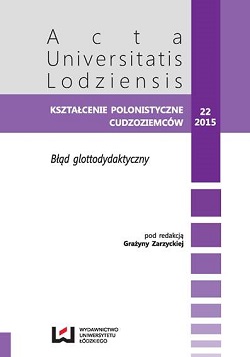Investigating different approaches to errors and correction in the conteporary glottodidactics
DOI:
https://doi.org/10.18778/0860-6587.22.04Keywords:
errors and correction, error analysis, feedback, categories of error treatment, focus on form vs focus on meaning, interlanguage, fossilization, second language acquisitionAbstract
Learning languages is a process that involves the making of misteakes and has been a controversial issue in second language acquisition area of study and research. The aim of the paper is to examine such aspects of second language acquistion as error treatment in the language classroom as well as the provision of negative evidence nad corrective feedback (feedback types and learner responses to feedback) and effectiveness of form-focused instruction.
References
Biedroń A., 2009, Czy neurologia ma zastosowanie w dydaktyce nauczania języków obcych?, w: M. Pawlak, M. Derenowski, B. Wolski (red.), Problemy współczesnej dydaktyki języków obcych, Poznań–Kalisz, s. 29–40.
Google Scholar
Brown H.D., 2007, Principles of Language Learning and Teaching, Pearson Education.
Google Scholar
Corder S., 1971, Idiosyncratic dialecs and error analysis, „International Review of Applied Linguistics”, nr 5, s. 147–159.
Google Scholar
DOI: https://doi.org/10.1515/iral.1971.9.2.147
Ellis R., 2007, The differential effect of corrective feedback on two grammatical structures, w: A. Mackey (red.), Conversational interaction in second language acquisition, Oxford: Oxford University Press, s. 339–360.
Google Scholar
Ellis R., 2009, Corrective feedback and teacher development, „L2 Journal”, nr 1, s. 3–18.
Google Scholar
DOI: https://doi.org/10.5070/L2.V1I1.9054
Fries C., 1952, The structure of English, New York: Harcourt, Brace & World.
Google Scholar
Gass S., 2003, Input and interaction, w: C.J. Doughty, M.H. Long (red.), The Handbook of Second Language Acquisition, s. 224–255.
Google Scholar
DOI: https://doi.org/10.1002/9780470756492.ch9
Janowska I., Rabiej A., 2014, Zadanie jako forma wspierania refleksyjnego nauczania gramatyki, w: „Neofilolog”, nr 43/2, tom: Podsystemy języka w praktyce glottodydaktycznej, pod red. M. Gajosa, Poznań–Łódź, s. 143–154.
Google Scholar
DOI: https://doi.org/10.14746/n.2014.43.2.8
Kita M., Czempka-Wiewióra M., Ślawska M. (red.), Błąd językowy w perspektywie komunikacyjnej, Seria: „Językoznawstwo”, nr 4, Katowice.
Google Scholar
Komorowska H., 2002, Metodyka nauczania języków obcych, Warszawa.
Google Scholar
Krashen S., Terrell T., 1983, The natural approach: Language acquisition in the classroom, Oxford: Pergamon Press.
Google Scholar
Lado R., 1957, Linguistics across cultures, Ann Arbor: University of Michigan Press.
Google Scholar
Lantolf J., 2006, Sociocultural Theory and L2: State of the art, „Studies in Second Lnaguage Acquisition”, nr 28, s. 67–109.
Google Scholar
DOI: https://doi.org/10.1017/S0272263106060037
Lewicka-Mroczek E., 2009, Błąd językowy na lekcji języka obcego. Sposoby reagowania i terapii, w: H. Komorowska (red.), Skuteczna nauka języka obcego. Struktura i przebieg zajęć językowych, Warszawa, s. 25–36.
Google Scholar
Lightbown P. M., Spada N., 2011, How Languages are Learned, Oxford: Oxford University Press.
Google Scholar
Loewen S., Philp J., 2006, Recasts in the adult English L2 classroom: Characteristics, explicitness and effectiveness, „Modern Language Journal”, nr 90, s. 536–556.
Google Scholar
DOI: https://doi.org/10.1111/j.1540-4781.2006.00465.x
Long M. H., 1983, Linguistic and conversational adjustments to non–native speakers, „Studies in Second Language Acquisition”, nr 5, s. 177–193.
Google Scholar
DOI: https://doi.org/10.1017/S0272263100004848
Long M. H., 1996, The role of the linguistic environment in second language acquisition, w: W. Richie, T. Bahatia (red.), Handbook of research on second language acquisition, s. 413–468.
Google Scholar
DOI: https://doi.org/10.1016/B978-012589042-7/50015-3
Mackey A. (red.), 2007, Conversational interaction in second language acquisition, Oxford: Oxford University Press.
Google Scholar
Lyster R., Ranta L., 1997, Corrective feedback and learner uptake: Negotiation of form in communicative classrooms, „Studies in Second Language Acquisition”, nr 19, s. 37–66.
Google Scholar
DOI: https://doi.org/10.1017/S0272263197001034
Pawlak M., 2006, The Place of Form–Focused Instruction in the Foreign Language Classroom, Kalisz–Poznań.
Google Scholar
Pawlak M., 2009, Rola nauczyciela w kształtowaniu procesów interakcyjnych w klasie językowej, w: M. Pawlak, A. Mystkowska-Wiertelak, A. Pietrzykowska (red.), Nauczyciel języków obcych dziś i jutro, Poznań–Kalisz, s. 311–337.
Google Scholar
Pawlak M., 2013, Czynniki warunkujące występowanie i skuteczność korekty błędów językowych podczas mówienia, w: M. Pawlak (red.), Mówienie w języku obcym: skuteczne uczenie się, nauczanie i ocenianie, Poznań–Kalisz–Konin, s. 305–326.
Google Scholar
Schmidt R., 1990, The role of consciousness in second language learning, „Applied Linguistics”, nr 11, s. 17–46.
Google Scholar
DOI: https://doi.org/10.1093/applin/11.2.129
Selinker L., 1972, Interlanguage, „International Review of Applied Linguistics“, nr 10, s. 201–231.
Google Scholar
DOI: https://doi.org/10.1515/iral.1972.10.1-4.209
Swain M., 1985, Communicative competence: Some roles of comprehensible input and comprehensible output in its development, w: S. Gass, C. Madden (red.), Input in Second Language Acquisition, Rowley, MA: Newbury House, s. 235–253.
Google Scholar
Szulc A., 1994, Słownik dydaktyki języków obcych, Warszawa.
Google Scholar
Truscott J., 1996, Review article: The case against grammar correction in L2 writing classes, „Language Learning”, nr 46, s. 327–369.
Google Scholar
DOI: https://doi.org/10.1111/j.1467-1770.1996.tb01238.x
Truscott J., 1999, What’s wrong with oral correction?, „Canadian Modern Language Review”, nr 55, s. 437–456.
Google Scholar
DOI: https://doi.org/10.3138/cmlr.55.4.437
Vigil N., Oller J., 1976, Rule fossilization: A tentative model, „Language Learning“, nr 26, s. 281–295.
Google Scholar
DOI: https://doi.org/10.1111/j.1467-1770.1976.tb00278.x
Zawadzka E., 2004, Nauczyciele języków obcych w dobie przemian, Kraków.
Google Scholar
Downloads
Published
How to Cite
Issue
Section
License

This work is licensed under a Creative Commons Attribution-NonCommercial-NoDerivatives 4.0 International License.










